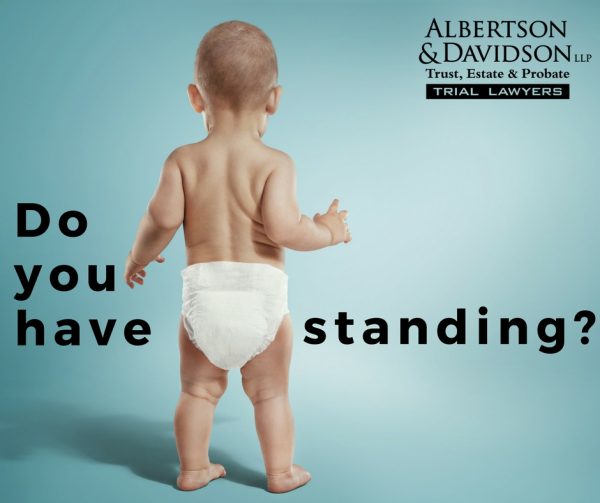
Who has the right to challenge a Will, or a Trust for that matter? To challenge a Will or a Trust in California, the person filing the Trust or Will contest lawsuit must have legal standing to do so. The concept of standing has evolved from centuries of jurisprudence, first in England and then adopted by the United States. Basically, courts do not want to adjudicate claims between people unless the people have a legal or economic interest in the lawsuit. It would make no sense to waste court time having trials between parties who have nothing to win or lose.
Understanding “Interested Parties” in Probate Code Section 48
In Trust or Will actions standing begins with Probate Code section 48, which sets forth the definition of “interested parties” to include: an heir, devisee, child, spouse, creditor, beneficiary, and any other person having a property right in or claim against a trust estate or the estate of a decedent which may be affected by the proceeding.
While the interested party definition sounds broad, there is a big limitation—the party must have a property right that will be affected by the lawsuit. In O’Brien’s Estate, the court stated that “[A]n ‘interested person’ is one who has such a pecuniary interest in the devolution of the testator’s estate as may be impaired or defeated by the probate of the will or be benefited by having it set aside.” (In re O’Brien’s Estate (1966) 246 Cal. App. 2s 788.) In other words, the Trust or Will that you are challenging must give you less than what you would otherwise receive without that Trust or Will. If you are receiving the same amount or more under the new Trust or Will, then you do not have standing to sue.
Practical Considerations for Establishing Standing in Trust or Will Contests
From a practical viewpoint, standing can be easily tested by imagining what would happen if the new Trust or Will did not exist. If you would get more if the Trust or Will is removed, then you have standing to sue. If you would get less or the same if the Trust or Will is removed, then you do NOT have standing to sue. And if you get nothing regardless of whether the Trust or Will exists, then you have NO standing to sue. Simply put, there must be something, financially speaking, that you have to win or lose based on the outcome of the Trust or Will lawsuit.
In most cases, the people who lose assets because of a new Trust or Will are the only ones who want to challenge those documents anyway. It makes little sense to spend your time and money challenging something from which you will not benefit. But there are times when someone wants to challenge a document based on principal.
For example, assume that you are to receive half of the estate under a Trust and the other half is passing to charity. You like this plan and think it best represents your parent’s intent. But then a Trust amendment is created shortly before your parent dies where the charitable gift is replaced by half the estate passing to your estranged brother, but your gift remains the same. Can you challenge the Trust amendment after your parent dies to reinstate the charitable gift?
To start with, you are both an heir and beneficiary of your parent’s estate, so you fit the definition of an “interested party” under Probate Code section 48. But your interests in the estate are not being affected by the Trust amendment. You receive half the estate under the initial Trust and you receive half the estate under the Trust amendment—there is no financial difference to you. Therefore, you have NO standing to contest the Trust amendment. While you may think that the gift of half the estate to your brother is not what your parent intended, there is nothing you can do to challenge that transfer because your property interests are not affected.
However, the charity who was named to originally receive half of the estate would have standing to sue because their gift was completely removed. Perhaps a call to the charity to alert them to the problem is in order. The charity was a prior beneficiary under the initial Trust, and their property interests are substantially affected (considering they lost their entire gift), thus they have standing to sue if they choose to do so.
The bottom line: if you are an heir, devisee, child, spouse, creditor, or beneficiary who lost something under the new Trust or Will, then you have standing to file a Trust or Will lawsuit in court.
